ACCG100 Case Study: Royal Commission and Banking Misconduct
VerifiedAdded on 2023/04/20
|7
|1556
|145
Case Study
AI Summary
This case study analyzes the ethical misconduct within the Australian banking, financial services, and superannuation sector, as revealed by the Banking Royal Commission. It outlines the key findings and recommendations of the commission's final report, focusing on ethical breaches. The study selects a key finding related to the Commonwealth Bank of Australia charging fees for non-existent services to explore the underlying ethical misconduct, its impact on customers, the community, employees, and regulators. It concludes that greed, rather than a lack of regulation, was the primary driver of the misconduct and reflects on the importance of financial transparency and corporate governance in fostering ethical business conduct. The report references key sources, including the Australian Financial Review and The Guardian, to support its analysis.
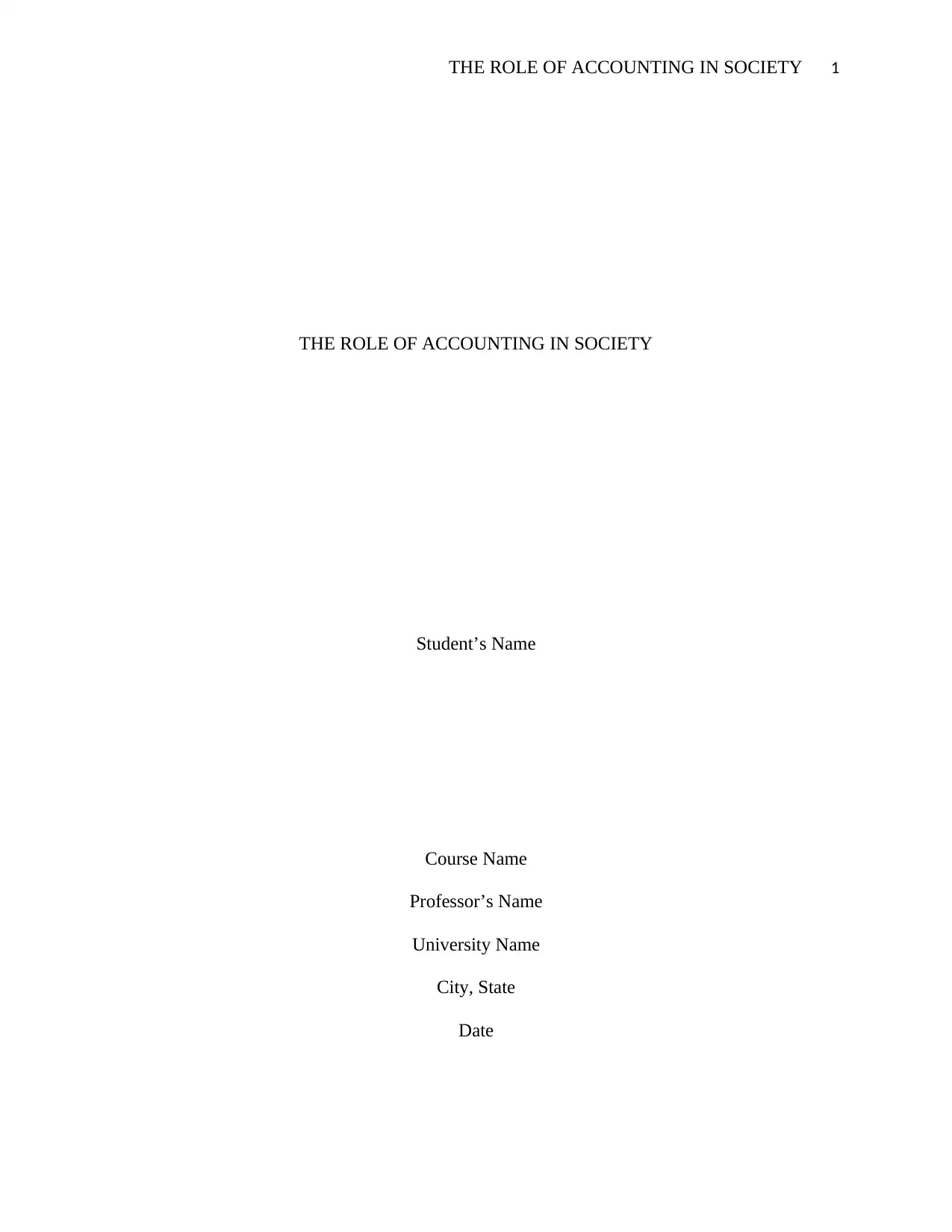
THE ROLE OF ACCOUNTING IN SOCIETY 1
THE ROLE OF ACCOUNTING IN SOCIETY
Student’s Name
Course Name
Professor’s Name
University Name
City, State
Date
THE ROLE OF ACCOUNTING IN SOCIETY
Student’s Name
Course Name
Professor’s Name
University Name
City, State
Date
Paraphrase This Document
Need a fresh take? Get an instant paraphrase of this document with our AI Paraphraser
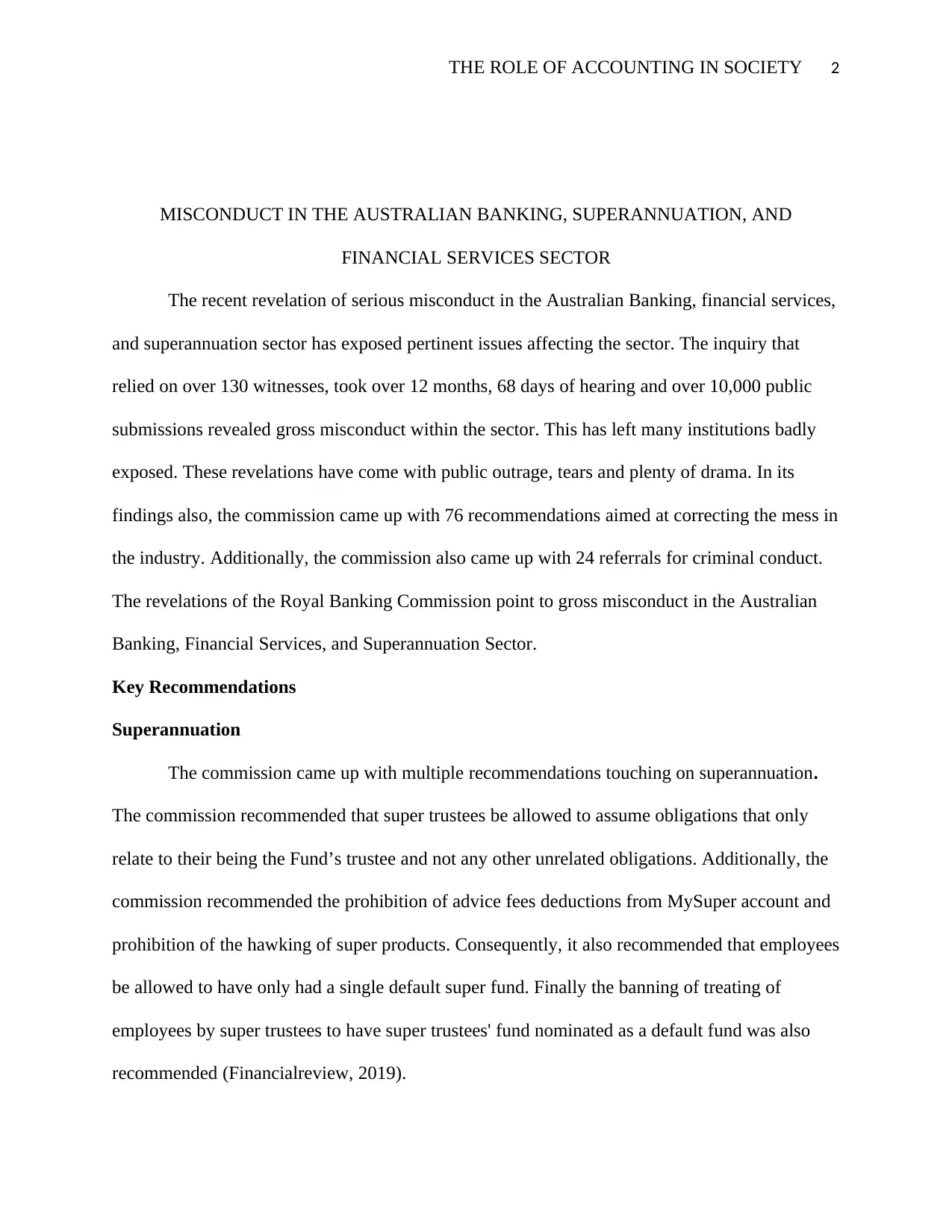
THE ROLE OF ACCOUNTING IN SOCIETY 2
MISCONDUCT IN THE AUSTRALIAN BANKING, SUPERANNUATION, AND
FINANCIAL SERVICES SECTOR
The recent revelation of serious misconduct in the Australian Banking, financial services,
and superannuation sector has exposed pertinent issues affecting the sector. The inquiry that
relied on over 130 witnesses, took over 12 months, 68 days of hearing and over 10,000 public
submissions revealed gross misconduct within the sector. This has left many institutions badly
exposed. These revelations have come with public outrage, tears and plenty of drama. In its
findings also, the commission came up with 76 recommendations aimed at correcting the mess in
the industry. Additionally, the commission also came up with 24 referrals for criminal conduct.
The revelations of the Royal Banking Commission point to gross misconduct in the Australian
Banking, Financial Services, and Superannuation Sector.
Key Recommendations
Superannuation
The commission came up with multiple recommendations touching on superannuation.
The commission recommended that super trustees be allowed to assume obligations that only
relate to their being the Fund’s trustee and not any other unrelated obligations. Additionally, the
commission recommended the prohibition of advice fees deductions from MySuper account and
prohibition of the hawking of super products. Consequently, it also recommended that employees
be allowed to have only had a single default super fund. Finally the banning of treating of
employees by super trustees to have super trustees' fund nominated as a default fund was also
recommended (Financialreview, 2019).
MISCONDUCT IN THE AUSTRALIAN BANKING, SUPERANNUATION, AND
FINANCIAL SERVICES SECTOR
The recent revelation of serious misconduct in the Australian Banking, financial services,
and superannuation sector has exposed pertinent issues affecting the sector. The inquiry that
relied on over 130 witnesses, took over 12 months, 68 days of hearing and over 10,000 public
submissions revealed gross misconduct within the sector. This has left many institutions badly
exposed. These revelations have come with public outrage, tears and plenty of drama. In its
findings also, the commission came up with 76 recommendations aimed at correcting the mess in
the industry. Additionally, the commission also came up with 24 referrals for criminal conduct.
The revelations of the Royal Banking Commission point to gross misconduct in the Australian
Banking, Financial Services, and Superannuation Sector.
Key Recommendations
Superannuation
The commission came up with multiple recommendations touching on superannuation.
The commission recommended that super trustees be allowed to assume obligations that only
relate to their being the Fund’s trustee and not any other unrelated obligations. Additionally, the
commission recommended the prohibition of advice fees deductions from MySuper account and
prohibition of the hawking of super products. Consequently, it also recommended that employees
be allowed to have only had a single default super fund. Finally the banning of treating of
employees by super trustees to have super trustees' fund nominated as a default fund was also
recommended (Financialreview, 2019).
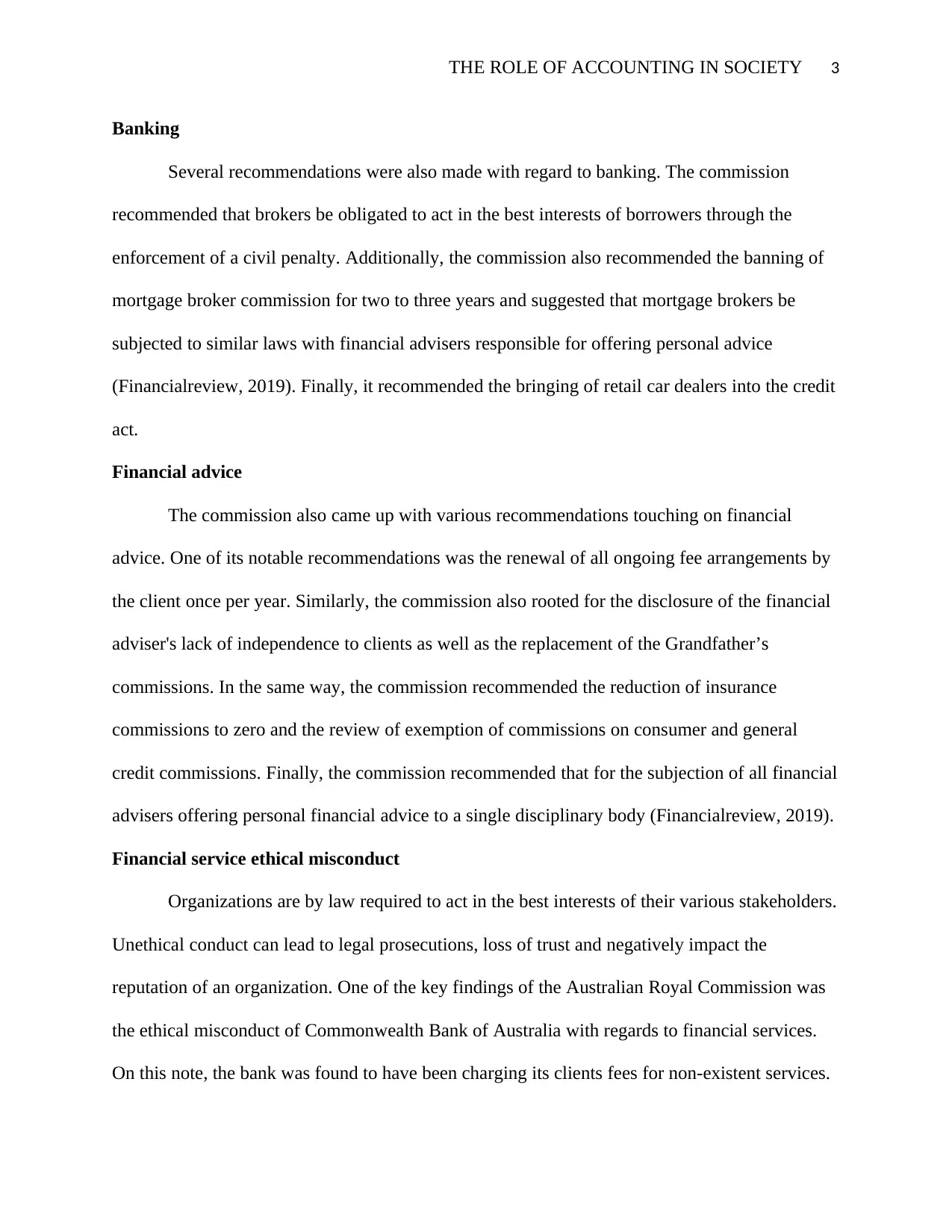
THE ROLE OF ACCOUNTING IN SOCIETY 3
Banking
Several recommendations were also made with regard to banking. The commission
recommended that brokers be obligated to act in the best interests of borrowers through the
enforcement of a civil penalty. Additionally, the commission also recommended the banning of
mortgage broker commission for two to three years and suggested that mortgage brokers be
subjected to similar laws with financial advisers responsible for offering personal advice
(Financialreview, 2019). Finally, it recommended the bringing of retail car dealers into the credit
act.
Financial advice
The commission also came up with various recommendations touching on financial
advice. One of its notable recommendations was the renewal of all ongoing fee arrangements by
the client once per year. Similarly, the commission also rooted for the disclosure of the financial
adviser's lack of independence to clients as well as the replacement of the Grandfather’s
commissions. In the same way, the commission recommended the reduction of insurance
commissions to zero and the review of exemption of commissions on consumer and general
credit commissions. Finally, the commission recommended that for the subjection of all financial
advisers offering personal financial advice to a single disciplinary body (Financialreview, 2019).
Financial service ethical misconduct
Organizations are by law required to act in the best interests of their various stakeholders.
Unethical conduct can lead to legal prosecutions, loss of trust and negatively impact the
reputation of an organization. One of the key findings of the Australian Royal Commission was
the ethical misconduct of Commonwealth Bank of Australia with regards to financial services.
On this note, the bank was found to have been charging its clients fees for non-existent services.
Banking
Several recommendations were also made with regard to banking. The commission
recommended that brokers be obligated to act in the best interests of borrowers through the
enforcement of a civil penalty. Additionally, the commission also recommended the banning of
mortgage broker commission for two to three years and suggested that mortgage brokers be
subjected to similar laws with financial advisers responsible for offering personal advice
(Financialreview, 2019). Finally, it recommended the bringing of retail car dealers into the credit
act.
Financial advice
The commission also came up with various recommendations touching on financial
advice. One of its notable recommendations was the renewal of all ongoing fee arrangements by
the client once per year. Similarly, the commission also rooted for the disclosure of the financial
adviser's lack of independence to clients as well as the replacement of the Grandfather’s
commissions. In the same way, the commission recommended the reduction of insurance
commissions to zero and the review of exemption of commissions on consumer and general
credit commissions. Finally, the commission recommended that for the subjection of all financial
advisers offering personal financial advice to a single disciplinary body (Financialreview, 2019).
Financial service ethical misconduct
Organizations are by law required to act in the best interests of their various stakeholders.
Unethical conduct can lead to legal prosecutions, loss of trust and negatively impact the
reputation of an organization. One of the key findings of the Australian Royal Commission was
the ethical misconduct of Commonwealth Bank of Australia with regards to financial services.
On this note, the bank was found to have been charging its clients fees for non-existent services.
⊘ This is a preview!⊘
Do you want full access?
Subscribe today to unlock all pages.

Trusted by 1+ million students worldwide
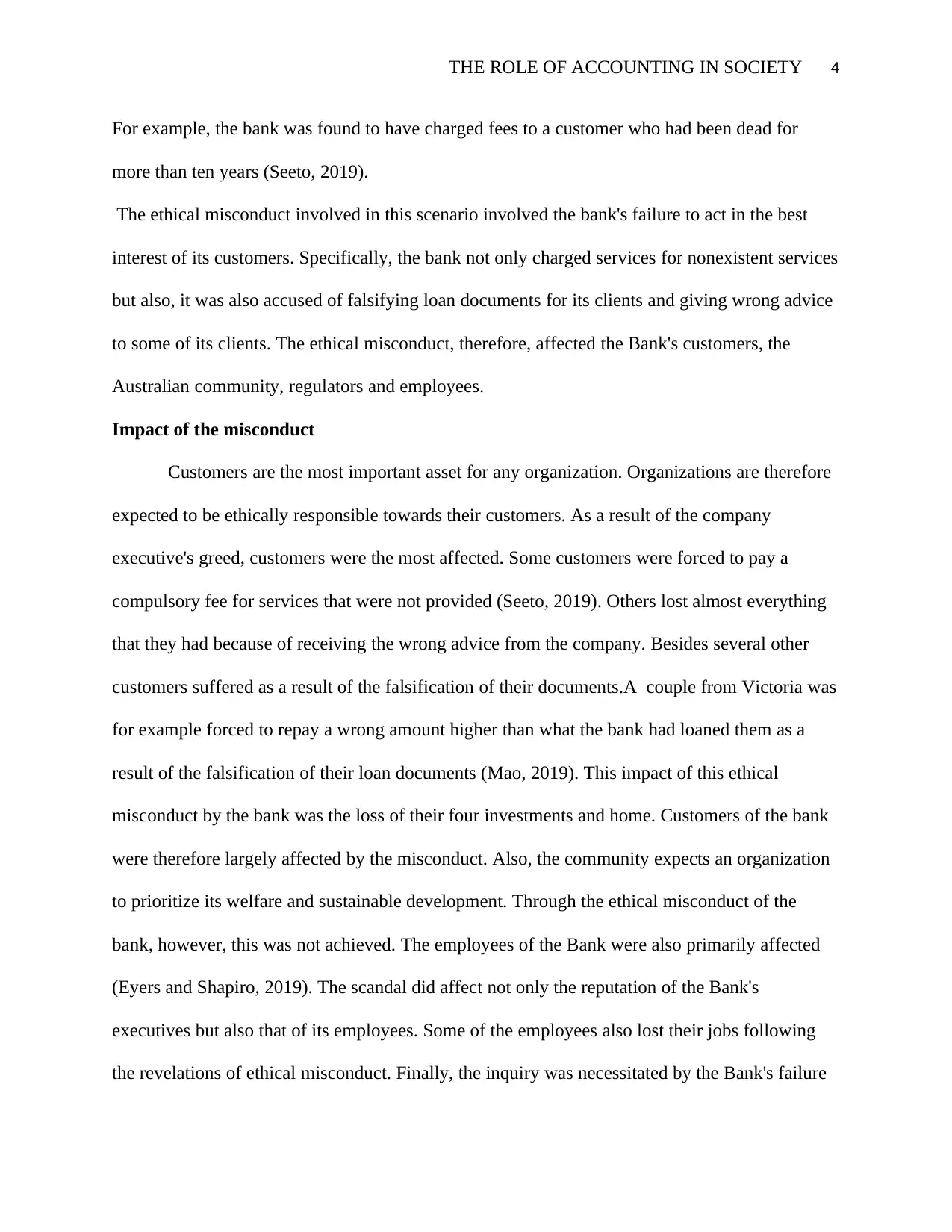
THE ROLE OF ACCOUNTING IN SOCIETY 4
For example, the bank was found to have charged fees to a customer who had been dead for
more than ten years (Seeto, 2019).
The ethical misconduct involved in this scenario involved the bank's failure to act in the best
interest of its customers. Specifically, the bank not only charged services for nonexistent services
but also, it was also accused of falsifying loan documents for its clients and giving wrong advice
to some of its clients. The ethical misconduct, therefore, affected the Bank's customers, the
Australian community, regulators and employees.
Impact of the misconduct
Customers are the most important asset for any organization. Organizations are therefore
expected to be ethically responsible towards their customers. As a result of the company
executive's greed, customers were the most affected. Some customers were forced to pay a
compulsory fee for services that were not provided (Seeto, 2019). Others lost almost everything
that they had because of receiving the wrong advice from the company. Besides several other
customers suffered as a result of the falsification of their documents.A couple from Victoria was
for example forced to repay a wrong amount higher than what the bank had loaned them as a
result of the falsification of their loan documents (Mao, 2019). This impact of this ethical
misconduct by the bank was the loss of their four investments and home. Customers of the bank
were therefore largely affected by the misconduct. Also, the community expects an organization
to prioritize its welfare and sustainable development. Through the ethical misconduct of the
bank, however, this was not achieved. The employees of the Bank were also primarily affected
(Eyers and Shapiro, 2019). The scandal did affect not only the reputation of the Bank's
executives but also that of its employees. Some of the employees also lost their jobs following
the revelations of ethical misconduct. Finally, the inquiry was necessitated by the Bank's failure
For example, the bank was found to have charged fees to a customer who had been dead for
more than ten years (Seeto, 2019).
The ethical misconduct involved in this scenario involved the bank's failure to act in the best
interest of its customers. Specifically, the bank not only charged services for nonexistent services
but also, it was also accused of falsifying loan documents for its clients and giving wrong advice
to some of its clients. The ethical misconduct, therefore, affected the Bank's customers, the
Australian community, regulators and employees.
Impact of the misconduct
Customers are the most important asset for any organization. Organizations are therefore
expected to be ethically responsible towards their customers. As a result of the company
executive's greed, customers were the most affected. Some customers were forced to pay a
compulsory fee for services that were not provided (Seeto, 2019). Others lost almost everything
that they had because of receiving the wrong advice from the company. Besides several other
customers suffered as a result of the falsification of their documents.A couple from Victoria was
for example forced to repay a wrong amount higher than what the bank had loaned them as a
result of the falsification of their loan documents (Mao, 2019). This impact of this ethical
misconduct by the bank was the loss of their four investments and home. Customers of the bank
were therefore largely affected by the misconduct. Also, the community expects an organization
to prioritize its welfare and sustainable development. Through the ethical misconduct of the
bank, however, this was not achieved. The employees of the Bank were also primarily affected
(Eyers and Shapiro, 2019). The scandal did affect not only the reputation of the Bank's
executives but also that of its employees. Some of the employees also lost their jobs following
the revelations of ethical misconduct. Finally, the inquiry was necessitated by the Bank's failure
Paraphrase This Document
Need a fresh take? Get an instant paraphrase of this document with our AI Paraphraser
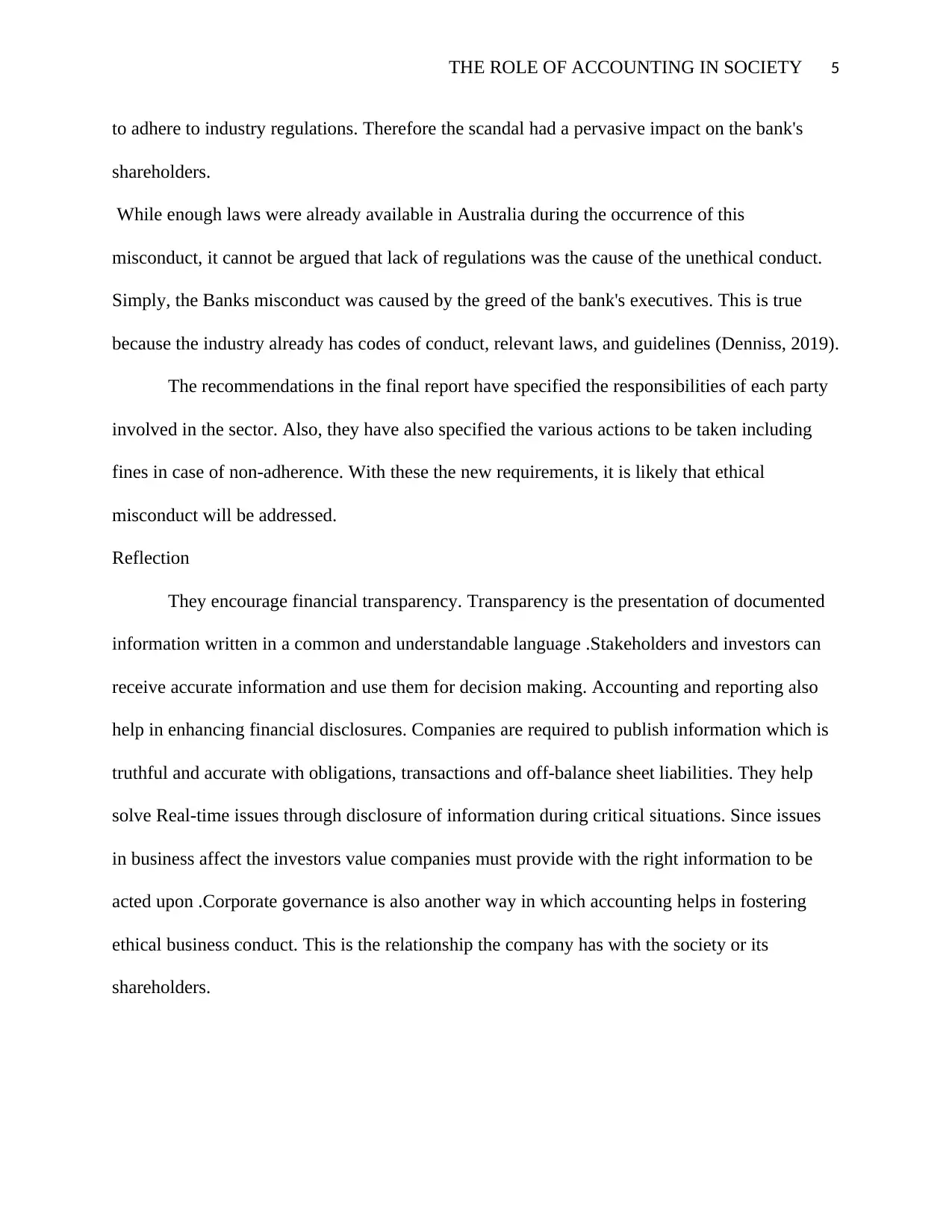
THE ROLE OF ACCOUNTING IN SOCIETY 5
to adhere to industry regulations. Therefore the scandal had a pervasive impact on the bank's
shareholders.
While enough laws were already available in Australia during the occurrence of this
misconduct, it cannot be argued that lack of regulations was the cause of the unethical conduct.
Simply, the Banks misconduct was caused by the greed of the bank's executives. This is true
because the industry already has codes of conduct, relevant laws, and guidelines (Denniss, 2019).
The recommendations in the final report have specified the responsibilities of each party
involved in the sector. Also, they have also specified the various actions to be taken including
fines in case of non-adherence. With these the new requirements, it is likely that ethical
misconduct will be addressed.
Reflection
They encourage financial transparency. Transparency is the presentation of documented
information written in a common and understandable language .Stakeholders and investors can
receive accurate information and use them for decision making. Accounting and reporting also
help in enhancing financial disclosures. Companies are required to publish information which is
truthful and accurate with obligations, transactions and off-balance sheet liabilities. They help
solve Real-time issues through disclosure of information during critical situations. Since issues
in business affect the investors value companies must provide with the right information to be
acted upon .Corporate governance is also another way in which accounting helps in fostering
ethical business conduct. This is the relationship the company has with the society or its
shareholders.
to adhere to industry regulations. Therefore the scandal had a pervasive impact on the bank's
shareholders.
While enough laws were already available in Australia during the occurrence of this
misconduct, it cannot be argued that lack of regulations was the cause of the unethical conduct.
Simply, the Banks misconduct was caused by the greed of the bank's executives. This is true
because the industry already has codes of conduct, relevant laws, and guidelines (Denniss, 2019).
The recommendations in the final report have specified the responsibilities of each party
involved in the sector. Also, they have also specified the various actions to be taken including
fines in case of non-adherence. With these the new requirements, it is likely that ethical
misconduct will be addressed.
Reflection
They encourage financial transparency. Transparency is the presentation of documented
information written in a common and understandable language .Stakeholders and investors can
receive accurate information and use them for decision making. Accounting and reporting also
help in enhancing financial disclosures. Companies are required to publish information which is
truthful and accurate with obligations, transactions and off-balance sheet liabilities. They help
solve Real-time issues through disclosure of information during critical situations. Since issues
in business affect the investors value companies must provide with the right information to be
acted upon .Corporate governance is also another way in which accounting helps in fostering
ethical business conduct. This is the relationship the company has with the society or its
shareholders.
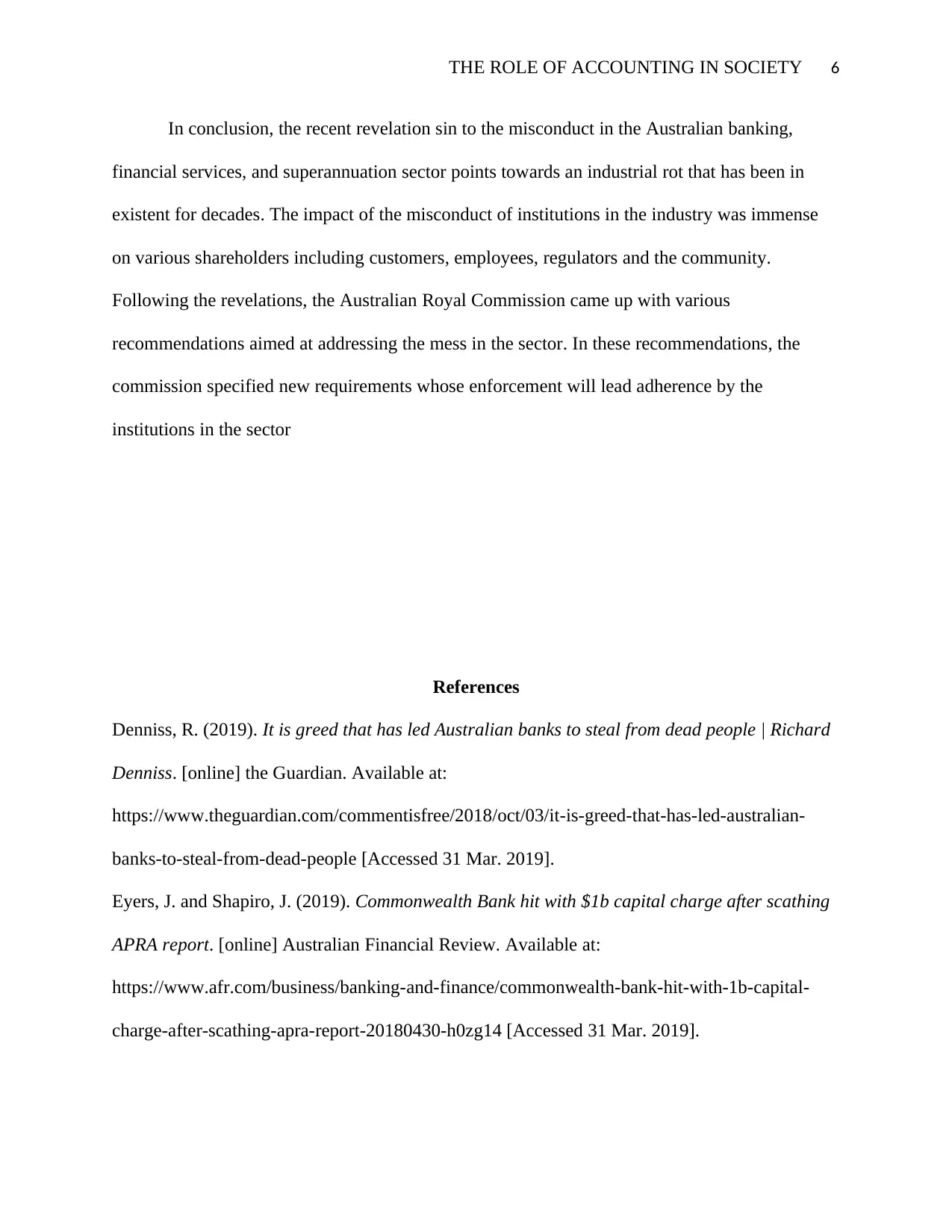
THE ROLE OF ACCOUNTING IN SOCIETY 6
In conclusion, the recent revelation sin to the misconduct in the Australian banking,
financial services, and superannuation sector points towards an industrial rot that has been in
existent for decades. The impact of the misconduct of institutions in the industry was immense
on various shareholders including customers, employees, regulators and the community.
Following the revelations, the Australian Royal Commission came up with various
recommendations aimed at addressing the mess in the sector. In these recommendations, the
commission specified new requirements whose enforcement will lead adherence by the
institutions in the sector
References
Denniss, R. (2019). It is greed that has led Australian banks to steal from dead people | Richard
Denniss. [online] the Guardian. Available at:
https://www.theguardian.com/commentisfree/2018/oct/03/it-is-greed-that-has-led-australian-
banks-to-steal-from-dead-people [Accessed 31 Mar. 2019].
Eyers, J. and Shapiro, J. (2019). Commonwealth Bank hit with $1b capital charge after scathing
APRA report. [online] Australian Financial Review. Available at:
https://www.afr.com/business/banking-and-finance/commonwealth-bank-hit-with-1b-capital-
charge-after-scathing-apra-report-20180430-h0zg14 [Accessed 31 Mar. 2019].
In conclusion, the recent revelation sin to the misconduct in the Australian banking,
financial services, and superannuation sector points towards an industrial rot that has been in
existent for decades. The impact of the misconduct of institutions in the industry was immense
on various shareholders including customers, employees, regulators and the community.
Following the revelations, the Australian Royal Commission came up with various
recommendations aimed at addressing the mess in the sector. In these recommendations, the
commission specified new requirements whose enforcement will lead adherence by the
institutions in the sector
References
Denniss, R. (2019). It is greed that has led Australian banks to steal from dead people | Richard
Denniss. [online] the Guardian. Available at:
https://www.theguardian.com/commentisfree/2018/oct/03/it-is-greed-that-has-led-australian-
banks-to-steal-from-dead-people [Accessed 31 Mar. 2019].
Eyers, J. and Shapiro, J. (2019). Commonwealth Bank hit with $1b capital charge after scathing
APRA report. [online] Australian Financial Review. Available at:
https://www.afr.com/business/banking-and-finance/commonwealth-bank-hit-with-1b-capital-
charge-after-scathing-apra-report-20180430-h0zg14 [Accessed 31 Mar. 2019].
⊘ This is a preview!⊘
Do you want full access?
Subscribe today to unlock all pages.

Trusted by 1+ million students worldwide
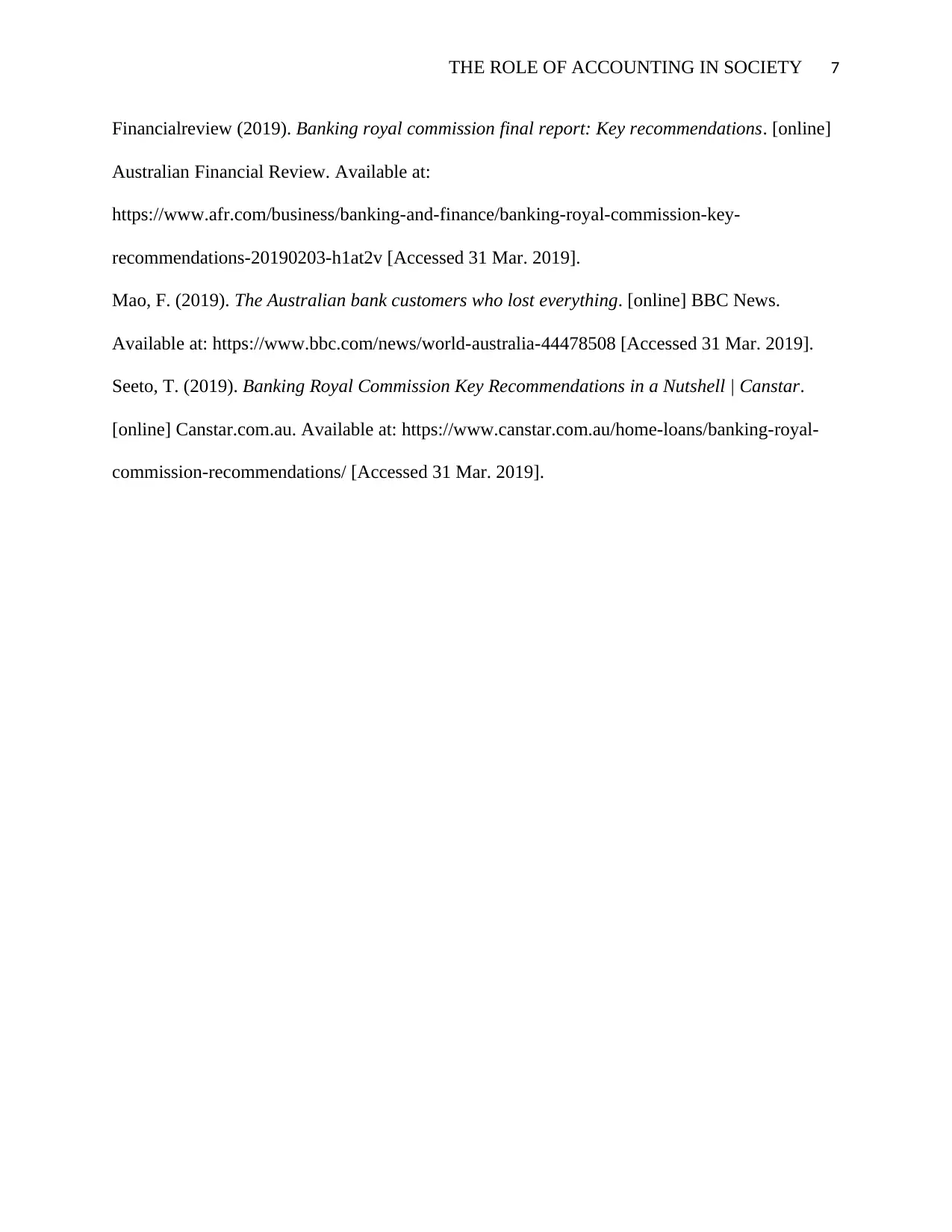
THE ROLE OF ACCOUNTING IN SOCIETY 7
Financialreview (2019). Banking royal commission final report: Key recommendations. [online]
Australian Financial Review. Available at:
https://www.afr.com/business/banking-and-finance/banking-royal-commission-key-
recommendations-20190203-h1at2v [Accessed 31 Mar. 2019].
Mao, F. (2019). The Australian bank customers who lost everything. [online] BBC News.
Available at: https://www.bbc.com/news/world-australia-44478508 [Accessed 31 Mar. 2019].
Seeto, T. (2019). Banking Royal Commission Key Recommendations in a Nutshell | Canstar.
[online] Canstar.com.au. Available at: https://www.canstar.com.au/home-loans/banking-royal-
commission-recommendations/ [Accessed 31 Mar. 2019].
Financialreview (2019). Banking royal commission final report: Key recommendations. [online]
Australian Financial Review. Available at:
https://www.afr.com/business/banking-and-finance/banking-royal-commission-key-
recommendations-20190203-h1at2v [Accessed 31 Mar. 2019].
Mao, F. (2019). The Australian bank customers who lost everything. [online] BBC News.
Available at: https://www.bbc.com/news/world-australia-44478508 [Accessed 31 Mar. 2019].
Seeto, T. (2019). Banking Royal Commission Key Recommendations in a Nutshell | Canstar.
[online] Canstar.com.au. Available at: https://www.canstar.com.au/home-loans/banking-royal-
commission-recommendations/ [Accessed 31 Mar. 2019].
1 out of 7
Related Documents
Your All-in-One AI-Powered Toolkit for Academic Success.
+13062052269
info@desklib.com
Available 24*7 on WhatsApp / Email
![[object Object]](/_next/static/media/star-bottom.7253800d.svg)
Unlock your academic potential
Copyright © 2020–2026 A2Z Services. All Rights Reserved. Developed and managed by ZUCOL.




